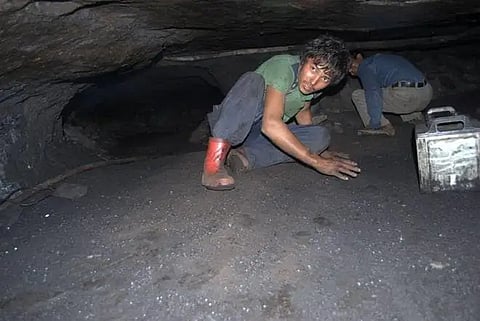
New Delhi: Three workers are trapped in an illegal rat-hole mine within the Patkai Hills of Assam's Tinsukia district, sparking urgent rescue efforts. One worker hails from Nepal, while the other two are from Meghalaya. The incident took place when a landslide struck the mine at 12:30 am while the workers were busy extracting coal.
Situated approximately 571 km from Guwahati, the Ledo-Margherita region boasts rich coal reserves nestled in the foothills of Patkai. Sadly, this promising landscape has turned perilous for the miners.
Rat-hole mining entails the excavation of narrow tunnels, typically 3-4 feet in diameter, often navigated by children to extract coal.
In 2014, the National Green Tribunal (NGT) banned this practice due to its hazardous nature — citing the risk of human fatalities resulting from unscientific mining methods. However, it continues.
Rescue operations are in full swing, but the outcome remains uncertain. Authorities, including Tinsukia District Magistrate Swapneel Paul, are coordinating efforts to address the crisis. The situation is dire, with fears mounting for the safety of the trapped individuals.
Reports indicate that the landslide occurred in a mining site between Bargolai and Namdang. Of the four miners present during the incident, three were trapped inside the tunnel, while the fourth was involved in transporting the extracted coal.
The Ledo-Margherita region, bordering Arunachal Pradesh's Changlang district, is renowned for its coal deposits but plagued by frequent landslides and flooding.
Tragically, such incidents are not uncommon in the Northeast's coal mines, with miners often risking their lives in precarious working environments.
“A significant syndicate operates behind these illegal mining activities, and it's certain that such operations cannot persist without the involvement of the administration. Their role in enabling and perpetuating this mining is undeniable,” alleged Debajit Baruah, who hails from Dibrugarh and is the assistant secretary of the central committee of Krishak Mukti Sangram Samiti, while talking to The Mooknayak.
He stated that these syndicates provide a huge chunk of money to various local parties in exchange for their silence.
“Everyone knows this, but no one wants to talk about it,” he said.
He further added that the rat-hole miners are generally immigrants who may not have proper identification. So, them being missing or dead would hardly catch people's eye. In addition, they would also not have an issue with being paid less.
Such incident, according to Baruah, keep happening frequently. Recently, a worker from the Missing tribe went missing. His family then went to all avenues, including the BJP headquarters at Guwahati. After 21 days of running, the dead body of the tribal worker was brought out from an illegal rat-hole.
Rat-Hole Mining Still a Big Issue in Northeast
In 2019, Congress leader and sitting MP from Nagaon, Pradyut Bordoloi, called for action against rat-hole mining, alleging that 4,000 to 5,000 such mines had emerged over the previous three years within 11 reserved forests and wildlife sanctuaries.
He accused the Tinsukia district administration of aiding and abetting the coal mafia. Bordoloi's allegations came shortly after the Gauhati High Court directed two district magistrates in the state to submit affidavits on illegal mining activities.
Similarly, in Meghalaya, despite the NGT's prohibition, none of the 26,000 abandoned rat-hole coal mines in East Jaintia Hills district have been closed, as revealed by the state’s high court. This neglect poses a severe threat to both human and livestock lives.
Ten years have passed since the NGT banned rat-hole mining and coal transportation in Meghalaya. However, over 14 lakh metric tons of mined coal remain to be transported, as reported by a one-man committee appointed by the high court to oversee mining and coal transportation activities.
The closure process for these abandoned mines is still in its initial stages, involving the preparation of a Detailed Project Report (DPR) by the Central Mine Planning and Design Institute Limited (CMPDI). The report highlights the urgency of closing these mines to mitigate the risk of human and livestock casualties.
Notably, the figure of 26,000 rat-hole mines only pertains to the East Jaintia Hills District, with no consideration given to similar mines in other districts like West Khasi Hills, South West Khasi Hills and South Garo Hills, where coal mining is rampant.
You can also join our WhatsApp group to get premium and selected news of The Mooknayak on WhatsApp. Click here to join the WhatsApp group.